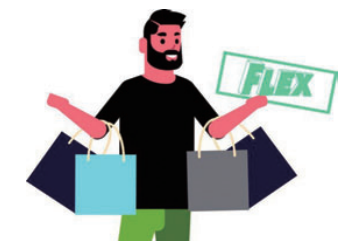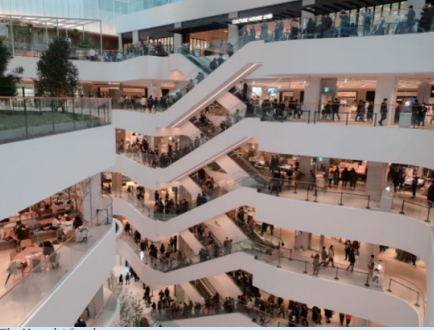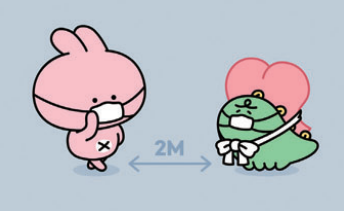According to the Seoul Institute’s April 7th report about the economic sentiment of consumers and revenge spending in the first quarter of 2021, about 24.7% of Seoul citizens appeared to have engaged in revenge spending. Revenge spending refers to a spending boom, whereby consuming suppression caused by external and non-economic factors suddenly explodes like a retaliation. The vaccinations and warmer weather raised the sentiment of consumers who had kept their consumption under control due to the prolonged coronavirus (COVID-19) pandemic. Therefore, the Sungkyun Times (SKT) will discuss the status and various stances of revenge spending and how to maximize this opportunity.
Introduction of Revenge Spending
What is Revenge Spending?
The term “revenge spending” was originally coined to explain a phenomenon where people buy lots of luxurious goods to commit revenge on their spouse through overconsumption. The meaning, however, transformed into a consumption trend of people buying some goods exponentially as if they were retaliating against something after non-economic, national-scale events such as terrorism and the COVID-19 pandemic. It is also called “compensation consumption” or “pent-up demand consumption” as its main purpose is to compensate themselves for the anxiety. Revenge spending has already occurred in many countries, and examples include the Severe Acute Respiratory Syndrome (SARS) in China and the 9.11 terrorism in the United States. Currently, revenge spending has appeared in Korea and China due to COVID-19. In 2020, according to China Central TV, train tickets for major tourism site destinations for holiday periods (April 3rd-5th) sold out within just five minutes, and the airline ticket reservation rate for the Labor Day holiday season (May 1st-5th) increased more than twice than that of 2019. In Korea, people’s revenge spending focused mainly on luxurious goods in department stores. According to the Seoul Economic Daily, credit card payments by consumers in March of this year increased more than 20% compared to the previous year. The most significant points of this investigation are that spending in department stores increased by 78.8%, and the sales amounts of department stores this year exceeded sales in 2019, which was before the outbreak of COVID-19. Revenge spending can play a role as a solution to escape from long-term economic decline, so many countries are concentrating on this phenomenon now.
The Reasons for Revenge Spending in Korea
One of the major reasons is that consumers who could not enjoy various leisure activities such as traveling or shopping due to COVID-19 began to relieve their negative feelings through special consumption. Moreover, people saved money to spend after the pandemic for such expenditures as overseas traveling and clothes. As the pandemic continued, however, these extra savings sneakily became “excess savings.” People are prone to purchase gifts for themselves using these excess savings and show off these products to others to prove that they have not been defeated by COVID-19. Also, since people want to reward themselves, the focus of revenge spending usually revolves around expensive luxury items. As vaccinations have begun and the weather is getting warmer, consumer sentiment has begun to revive. Jeong Yeon-seung, President of the Korea Distribution Association, said that “Consumers are psychologically exhausted as COVID-19 continues for a long time. While outdoor leisure activities are becoming possible with warmer weather and increased psychological stability because of vaccinations, people have started to consume what they want.” Not only have purchases through online platforms increased, but purchases at offline stores have also begun to rise in Korea with such proper economic and temporal environments.
Positive and Negative Effects of Revenge Spending
Positive Effects of Revenge Spending
1. Psychological Stability
Revenge spending seems to be a solution for psychological diseases such as Corona Blue. Corona Blue is a combination of “coronavirus” and “blue,” which means depression during the COVID-19 pandemic period. Although it is not a real medical diagnosis, many people have already experienced it, and they try to solve these kinds of psychological problems through revenge spending. For example, many people relieve stress by showing off purchased items to other people via social network services such as Facebook and Instagram. Finding joy in mundane life has become a trend and a strategy to maximize happiness for an uncertain future due to COVID-19. It can also reduce the anxiety about the future by providing psychological satisfaction through revenge spending in daily life.

2. Power to Endure a Difficult Period
In particular, revenge spending acts as a stimulus to help damaged companies escape stagnation. For example, a spring breeze is blowing in the travel industry thanks to revenge spending. Very Good Tour, a popular Korean travel agency, planned overseas package tours named “Reserve Your Hope” that can travel to about 50 countries after July 1st, 2021. 15,000 calls were reserved for these package tours, and considering that the average number of people per reservation is three, the actual reservation number of people is about 45,000. This resulted in total revenue of over 66.5 billion won. In addition, in the process, the reservation fees were 10,000 won per person, and this kind of capital security became a necessary foundation for maintenance for some companies in the current crisis. Even if revenge spending contributes to only a temporary increase in economic activity, it will be a driving force to endure this tough period and a great opportunity for the following periods for some companies.
Negative Effects of Revenge Spending
1. Temporal and Conspicuous Consumption of Luxury Goods
Revenge spending results in a temporary increase in consumption, and it is not helpful for a sustainable economic recovery. It cannot induce consumption in the long term because people are using money that had been saved for consumption after COVID-19. Sustainable consumption will be possible only when a perfect system is established in the quarantine system and when the employment rate returns to normal. Currently, most revenge spending is concentrated on luxury goods or expensive items in department stores. An “open-run” phenomenon continues every day, which means a lot of customers are waiting to buy luxury goods before the department stores open. They even stay up all night and run to the stores as soon as stores open. Moreover, self-employed business owners who do not sell expensive products are still suffering from the pandemic crisis because their products are not the main targets of revenge spending. According to an investigation by the aforementioned Seoul Economic Daily, payments in the food and beverage industry decreased by 13.6%, and transportation and warehousing businesses, including express buses, railroads, and passenger ships, also decreased by 17.8%. These results indicate that a large number of selfemployed people are still struggling, and they can even feel a sense of relative deprivation.

2. Concerns about the Rapid Spread of COVID-19
For revenge spending, people are gathering in confined spaces such as department stores and outlets where people are easily exposed to COVID-19. Most department stores do not install windows so that customers cannot look outside and view sights like the setting of the sun, making customers unable to realize that time is passing. This characteristic makes ventilation very difficult. On March 28th, at the Lotte World Mall in Jamsil, people crowded the mall from the opening hours, and they entered without checking their body temperatures. Likewise, at The Hyundai Seoul, a new department store opened in Yeouido in February 2021, a confirmed patient was reported after just three days of opening. The number of visitors to shopping malls and department stores is increasing due to revenge spending, and more serious situations can happen as tracking the movement of confirmed patients is difficult and takes a long time.

Revenge Spending for Economic Growth
Customers: Finding the Golden Mean and Discretion
Consumption with spare money could relieve stress and help to keep people’s lives balanced; however, excessive and impulsive consumption may ruin people’s lives. Therefore, people should be aware of the negative consequences of revenge spending. Furthermore, no matter how well quarantine policies are conducted, people can be infected without experiencing any symptoms as COVID-19 has a long incubation period and strong transmission power. Therefore, people should be cautious that they could be the ones who spread the virus to a large number of people. People who have already participated in revenge spending during their travels should avoid crowded places as much as possible, and selfquarantining and taking COVID-19 diagnostic tests is necessary.

Sellers: Complying with Quarantine Policies and Implementing Strategic Marketing
Offline stores should limit and reduce the number of customers entering their buildings by using online reservation systems. Furthermore, stores should prepare safety lines such as putting signs every two meters to prevent people from crowding together before opening. Also, as they cannot measure temperature properly in underground parking lots due to the lower temperatures underground, stores should measure temperatures before entering the first floor of stores. To deal with criticisms about quarantine loopholes in resting areas at department stores and amusement parks, they should hire more employees. Implementing new marketing strategies might be necessary for traditional markets or self-employed businesses to keep pace with the revenge spending situation. As revenge spending in Korea focuses mainly on luxury goods, self-employed business owners should seek a way to promote their goods to increase sales. For instance, smart traditional markets in Hanam, Gyeonggi-do, combined their traditional markets with online shopping malls and made it possible for people to purchase high-quality luxury goods at low prices.
Government: Making Solutions for Fundamental Problems
To induce long-term consumption, the fundamental problems of employment should be solved. The employment rate has declined continuously since March of 2020, which was the beginning period of COVID-19. Therefore, the government should provide companies with subsidies and deregulate corporate activities through institutional changes. Moreover, national support projects should be fully expanded to some selfemployed businesses or traditional markets so that consumption focused only on luxury goods can be relieved. Also, on March 16th, the Central Disaster and Safety Countermeasure Headquarters announced strengthening quarantine policies in crowded areas to prevent the spread of the virus. These policies, however, reinforce the degree of quarantine only after there is a confirmed case. Even without any confirmed cases, some stores that have a certain capacity of customers should strengthen their policies. Like the mandatory hand sanitization policy in hospitals, effective policies must be constantly suggested and implemented. Revenge spending can be a great opportunity to recover from the economic crisis caused by COVID-19, but a balance between restrictions and support is needed.
Since the Korean economy is shrinking because of COVID-19, revenge spending seems to be a way to overcome this crisis. To seize the opportunities coming from revenge spending, efforts from all people in society are desperately needed. Customers, sellers, and governments should work together to overcome this difficult period by nurturing positive sides and reducing the negative consequences of revenge spending. The SKT hopes our economy overcomes this period by changing revenge spending into avenge spending like a hero that saves our economy.
